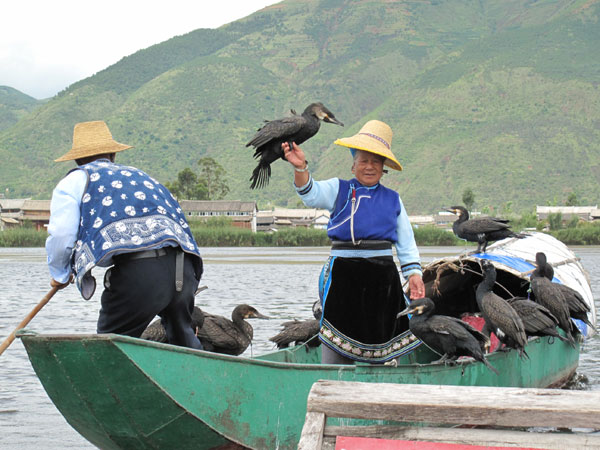Lake cleanup pays off big with tourist dividends
Updated: 2012-08-28 07:40
By Wu Wencong in Dali, Yunnan (China Daily)
|
||||||||
It was another sunny August morning by the side of Erhai Lake. Yang Chengzuo smiled from ear to ear as he stood in his yard, watching expat couples riding bikes on the wooden pathways that wind through the mixture of reeds, bulrushes and fleur-de-lis in the wetland park by the lake, thinking happily how every room in his 22-room family-run hostel was occupied.
Since the 36-year-old quit fishing and started the first hostel five years ago, 30 others have opened up in the lakeside village in Southwest China's Yunnan province.
 |
|
Villagers use trained cormorants to fish at a wetland in Eryuan county near Erhai Lake, Yunnan province. Wu Wencong / China Daily |
According to data provided by Eryuan county, tourism revenue in 2011 increased 64 percent compared with the year before.
Yang and his fellow villagers owe the thriving tourism industry largely to efforts by the local government to tackle pollution in Erhai Lake, whose beauty it heavily relies on to attract travelers from around the world to the tourist hotspot.
From January to June, the water quality in the lake remained above the minimum standard for drinking water - not an easy feat for a lake adjacent to a county with almost 300,000 residents.
A decade ago, few would have thought that the lake, which was severely polluted by blue algae, would be called "one of the best protected lakes located near densely populated areas" by the Ministry of Environmental Protection.
Ling Jiang, deputy head of the department of pollution prevention and control from the ministry, told China Daily that one of the key factors in the success of cleaning up the lake was a shift in focus from just cleaning the lake to the environment around the lake.
A wetland park occupying more than 600 hectares has been built along the west side of the lake, where most of the population lives. All kinds of domestic sewage used to be dumped directly into the water.
Since all of the polluting industries have been cleared out of the county, the main pollutants for the lake are now nitrogen and phosphorus, which are widely used in agriculture and daily life.
Liu Bin, from the environmental protection bureau of the Dali Bai autonomous prefecture, said the water coming out of the treatment plant already meets emission standards. It then stays for about two days in the wetland park, where about half of the nitrogen and phosphorus can be further absorbed by the 60 kinds of plants in the park.
Located where there used to be fish ponds, farmland and farm houses, the wetland park isolates Erhai Lake and saves it from human interference, forming a protective barrier and creating beautiful scenery that helps boost local tourism.
Liu Xin, a tourist from Beijing, said she had been thinking of leaving the area until she became fascinated with the wetland park along Erhai Lake.
"I came for the ancient city here, which was supposed to be a 'must-see' in a typical itinerary, but I didn't like it very much," said the 28-year-old who traveled alone.
Finding herself a room in a hostel with a full view of the lake, Liu decided to stay longer because of the scenery.
Former fishman Yang Chengzuo said the water used to stink so badly that no one dared to get close in summer. Now the situation has completely changed.
"I earn much more now than either fishing here or working in factories in other places," Yang said.
Aside from setting a buffer zone for the lake, local government has also managed to collect and treat all the domestic garbage in the 16 towns and villages surrounding the lake so that the water quality can stay high even during flood season.
Almost 1,000 people are hired as cleaners and are responsible for collecting trash along the lake and within their villages.

 Relief reaches isolated village
Relief reaches isolated village
 Rainfall poses new threats to quake-hit region
Rainfall poses new threats to quake-hit region
 Funerals begin for Boston bombing victims
Funerals begin for Boston bombing victims
 Quake takeaway from China's Air Force
Quake takeaway from China's Air Force
 Obama celebrates young inventors at science fair
Obama celebrates young inventors at science fair
 Earth Day marked around the world
Earth Day marked around the world
 Volunteer team helping students find sense of normalcy
Volunteer team helping students find sense of normalcy
 Ethnic groups quick to join rescue efforts
Ethnic groups quick to join rescue efforts
Most Viewed
Editor's Picks

|

|

|

|

|

|
Today's Top News
Health new priority for quake zone
Xi meets US top military officer
Japan's boats driven out of Diaoyu
China mulls online shopping legislation
Bird flu death toll rises to 22
Putin appoints new ambassador to China
Japanese ships blocked from Diaoyu Islands
Inspired by Guan, more Chinese pick up golf
US Weekly

|

|







